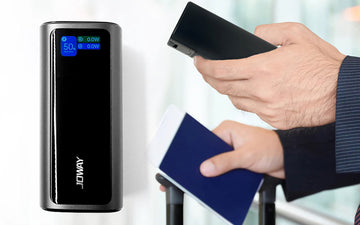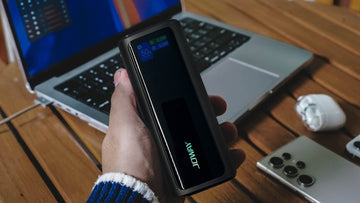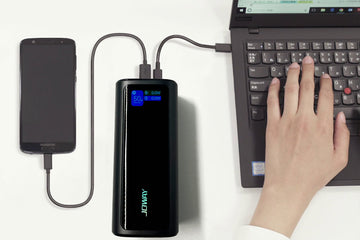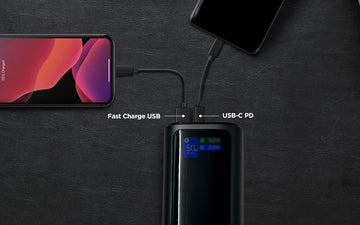
Can I carry a 20000mAh power bank in flight?
by leekelly on Mar 26, 2025
Introduction
Traveling with electronic devices is essential in today’s world, and a power bank ensures that your gadgets remain charged during long flights. However, airline regulations regarding lithium-ion batteries can be confusing. If you're wondering whether you can carry a 20,000mAh power bank on a flight, this comprehensive guide will clarify the rules, airline policies, TSA regulations, and tips for hassle-free travel.
Understanding Airline Regulations on Power Banks
Power banks are classified as portable lithium-ion batteries, which are subject to strict airline regulations due to safety concerns. These regulations are primarily set by aviation authorities such as:
-
The Transportation Security Administration (TSA) (USA)
-
The International Air Transport Association (IATA)
-
The Federal Aviation Administration (FAA)
Key Rules for Carrying Power Banks on Flights
-
Power Banks Must Be in Carry-On Luggage: Airlines do not allow power banks in checked baggage due to the risk of overheating and potential fire hazards.
-
Capacity Restrictions Apply: Airlines regulate power bank capacity in watt-hours (Wh). Most allow power banks up to 100Wh without approval, while those between 100Wh and 160Wh require airline permission.
-
Prohibited Items: Any power bank exceeding 160Wh is typically not allowed on a flight.
How to Calculate Watt-Hours (Wh) for Your Power Bank
Since airlines use watt-hours (Wh) instead of milliampere-hours (mAh) for restrictions, it’s crucial to understand the conversion formula:
Watt-hours (Wh) = (mAh × Voltage) ÷ 1000
Most power banks operate at 3.7V or 5V. Let’s calculate the Wh of a 20,000mAh power bank:
-
At 3.7V: (20,000mAh × 3.7V) ÷ 1000 = 74Wh
-
At 5V: (20,000mAh × 5V) ÷ 1000 = 100Wh
Since most 20,000mAh power banks are within the 100Wh limit, they are generally allowed in carry-on luggage without special approval.

TSA Guidelines for Carrying Power Banks on Planes
The TSA follows FAA regulations regarding lithium-ion batteries. Here’s what you need to know:
-
Power banks must be carried in hand luggage.
-
Power banks under 100Wh (including most 20,000mAh models) are allowed without airline approval.
-
Power banks between 100Wh and 160Wh require airline approval before boarding.
-
Power banks above 160Wh are not allowed on flights.
-
If requested, be prepared to show the power bank’s Wh rating (usually printed on the device).
-
Loose lithium batteries must be protected from short circuits, meaning you should keep them in their original packaging or a protective case.
Different Airlines’ Policies on Power Banks
While TSA and FAA rules apply broadly, individual airlines may have additional restrictions. Below are general guidelines from major airlines:
American Airlines
-
Power banks must be in carry-on baggage.
-
Power banks under 100Wh are allowed.
-
Power banks between 100Wh and 160Wh require airline approval.
Delta Airlines
-
Follows standard FAA rules.
-
No more than two power banks between 100Wh and 160Wh per passenger.
United Airlines
-
Allows power banks up to 100Wh without approval.
-
100-160Wh requires airline permission.
Southwest Airlines
-
Power banks must not be in checked baggage.
-
Capacity restrictions follow TSA and FAA rules.
International Airlines (Emirates, British Airways, Lufthansa, etc.)
-
Most airlines follow IATA guidelines: Under 100Wh is fine; 100-160Wh requires approval.
-
Some airlines have specific restrictions, so checking their policies before your trip is advisable.
Tips for Carrying a Power Bank on a Flight
To avoid any trouble at airport security, follow these tips:
1. Choose a Power Bank That Meets Airline Regulations
-
Stick to power banks under 100Wh to avoid needing airline approval.
-
Always check for the Wh rating on the power bank’s label.
2. Pack Your Power Bank Properly
-
Keep the power bank in your carry-on bag.
-
Avoid packing it with metal objects (like keys or coins) to prevent short circuits.
3. Keep Documentation Handy
-
If security asks, be ready to show the power bank’s Wh rating or specifications.
-
Some high-capacity power banks come with a safety certificate—carry it if needed.
4. Charge Your Devices Before Your Flight
-
Fully charge your gadgets in case security asks you to turn them on.
-
Some airlines may require you to demonstrate that your power bank is functioning correctly.
5. Check Airline Policies in Advance
-
If flying internationally, check your airline’s specific power bank regulations before your flight.
-
Some airlines may have stricter rules than the TSA.
What Happens if Your Power Bank Exceeds the Limit?
If your power bank exceeds the allowed capacity, you have the following options:
-
Leave it at home to avoid confiscation.
-
Ship it separately via a courier service that allows lithium-ion batteries.
-
Check with your airline if they have exceptions for specific devices.
Can I take WiCreat JOWAY Series 130W Power Bank 20000mAh on an airplane?
Yes, you can take the WiCreat JOWAY Series 130W Power Bank (20000mAh) on an airplane, but it must be carried in your carry-on luggage, not in checked baggage.
Airline regulations typically allow power banks under 100Wh without airline approval. To check if your power bank is within the limit, use this formula:
Wh = (mAh × V) ÷ 1000
Assuming your power bank is 20,000mAh and operates at 3.7V (typical lithium-ion voltage):
(20000 × 3.7) ÷ 1000 = 74Wh
Since 74Wh is below the 100Wh limit, you can bring it without special approval. However, if the voltage is higher (e.g., 14.8V for some high-power power banks), the Wh rating could exceed 100Wh, requiring airline approval. Always check your power bank’s label or specifications to confirm.
Conclusion
A 20,000mAh power bank is generally allowed on flights as long as it remains under 100Wh and is stored in carry-on luggage. By following TSA, FAA, and airline-specific guidelines, you can travel hassle-free with your power bank. Always check your power bank’s specifications and airline policies before heading to the airport to ensure compliance.
With these tips in mind, you can stay powered up on your travels without any security issues. Safe travels!




